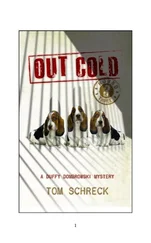Too young to have been called upon to join the attack on the Icelanders, I heard the shrieks and clamour of the massacre and ran to the side entrance of the Icelanders' longhouse, arriving on the scene just in time to see Freydis pick up Helgi's sword from under his bed and make sure that his brother Finnbogi did not have a chance to reveal the truth by running him through so powerfully that the blade emerged a hand's breadth out of his back. She then wrenched the blade clear and joined in the general bloodbath.
Again Norse custom had its malign influence. Once the massacre had started, there was no going back. Every man knew the pitiless truth. The moment that the first mortal blow had been struck, it was better to kill every last Icelander. Any survivor was a potential witness, and his or her evidence about the murders would lead to a cycle of revenge if a report of the atrocity reached their families back in Iceland. Contributing to this stark policy was the killing frenzy which now gripped the Greenlanders. They killed and killed and killed until they were tired. Only when every adult Icelander, male or female, was dead did they stop the slaughter. By then only five Icelanders were left alive, three boys and two girls, and they were huddled in a corner, wide-eyed and speechless with shock as they watched their parents cut down. Murdering the children was beyond the capacity of even the most blood-crazed Greenlander, but not Freydis. She ordered the men to complete the job. They looked back at her, panting with exhaustion, their swords and axes streaked with gore, their clothes spattered with blood, and the red madness slowly fading from their eyes. They looked drained and tired, and did not move. Freydis raised her borrowed sword, and screamed at them. 'Kill the brats! Kill them! Do as I say!'
I was well inside the longhouse. Appalled by the sight of what seemed like so many limp and blood-soaked bundles of clothing lying on the floor, I crept along the side wall and sank down into a corner, wishing that I was somewhere else. I sat with my back to the wall, trying to make myself invisible, with my arms around my knees and my head down. Hearing Freydis's harridan shriek I raised my head and saw her become grim and calm. Her sway over the men became almost diabolic. She seemed to dominate them like some awful creature from the Hel of the Gods, as she ordered the men to bring the children one by one before her. Such was her authority that the men obeyed, and they led the children to stand in front of her. Then, teeth clenched, she beheaded each child.
I vomited pale, acid bile.
FREYDIS NOW ORDERED that everything that would burn was to be collected and heaped around the bases of the heavy timber posts supporting the turf roofs of the longhouses. Wooden benches, scraps of timber, old rags, anything combustible was piled up. Then Freydis herself went down the line of pillars, setting fire to the materials. She was the last person to leave each building and heave the big door shut. By midday we could see that smoke, which had been issuing from the smoke hole, was also seeping out from the sides of the building, where the turf wall joined the roof.
The whole structure of the longhouse began to look like a smouldering charcoal burners' mound as the turf and wattle interior walls eventually caught fire. The heat steadily built up until we could feel it from forty paces away. Around the fire the last of the snow melted and turned to slush, and in the end the long curved roofs simply fell in with a soft thump, a few sparks curled up into the sky, and the remains of the longhouses which the Icelanders had spent three months building became their funeral pyres. Looking at the ruins, it was obvious to us that in a few winters there would be scarcely any trace that they had ever existed.
Freydis summoned us to a meeting in our own longhouse late that evening. We gathered in a glum silence. Many of us were ridden with guilt, a few were trying to boost their spirits by bragging that it was exactly what the Icelanders had deserved. But Freydis was clear-headed and unmoved. 'The only trace of the Icelanders' existence now lies in our heads,' she told us fiercely. 'No one else will know what has happened, if we keep our mouths shut about the events of this day. We, who are responsible, are the only witnesses. Here on the edge of the world there is no one else to observe and report. We control the only knowledge of what has happened.' Freydis promised us that we had been justified in destroying the Icelanders. Again she produced the lie that she had asked Finnbogi for the loan of the knorr and been refused. 'The Icelanders denied us their knorr,' she said. 'If we had not seized the initiative, they would have sailed away, leaving us behind to our deaths. We acted in self-defence by striking first. What we have done was to save our own lives.'
I do not know how many of us believed her, perhaps a few. Those who did not were either too ashamed or too shocked or frightened of what might happen if they disagreed to speak out. So we kept quiet and followed Freydis's orders when she told us to load the knorr with our possessions and a cargo of valuable Vinland timber to take back to Greenland, for even at that late stage Freydis was determined to make a profit from her venture.
We were so keen to get away from that sinister place that we had the boat loaded and ready to sail within a week. Then Freydis ordered that our longhouse, too, should be set on fire. She told us that when we returned to Greenland we were to say that we had decided to abandon the colony, but the Icelanders had elected to stay, that Freydis and Thorvard had purchased the knorr, and when last seen the Icelanders had been thriving and prosperous and alive. Should anyone in later years visit the site, all they would find would be the burnt-out ruins of the longhouses, and of course they would presume that the Skraelings had overwhelmed the settlement and destroyed every last colonist.
TEN

SUCH A MONSTROUS event could never be kept a secret. When we reached Brattahlid, our people were delighted to see us safely back, though disappointed to hear that once again our plans for a permanent settlement in Vinland had been abandoned. Freydis went immediately to her farm at Gardar, taking her followers with her. Some she bribed to keep quiet about the massacre of the Icelanders, others she threatened with death if they should reveal the details. Given her reputation for violence, these threats were very effective. But rumours soon began to leak out, like the smoke which rose from the smouldering longhouse. Some former Vinlanders blurted out the grisly details when they were drunk. A few shouted aloud during their nightmares. Most were clumsy liars, and inconsistencies in their stories were noticed. Finally, the swirl of rumour and doubt became so powerful that Leif himself decided he must get at the truth of what was happening with his property in Vinland. He asked his half-sister to visit him at Brattahlid, and when she refused, he had three of her thralls arrested and tortured to reveal what had really gone on at Leif s cabins. They quickly revealed the horrors of Vinland, and Leif was appalled. He could not bring himself to punish his half-sister directly, for that would violate his ties of kinship. But he pronounced a curse on her and her progeny and shunned her for the rest of his life.
He also refused to have under his roof anyone who had been involved in these despicable events. The result was that I, who had been an innocent bystander to the massacre, was banished from his household.
For me, it was out of the question to live in Gardar with Freydis. We had a mutual dislike and my presence would have reminded her of the blood-stained episode which was to blight the rest of her life. For a few weeks I lived with Tyrkir, now an old man with failing eyesight, in his cabin on the outskirts of Brattahlid, until my father Leif could make plans for me, his bastard child, to be shipped away. He arranged a passage for me aboard the next trading vessel that arrived and made it clear to me that it did not much matter where I went. I said goodbye to Tyrkir, who was probably the only person genuinely sorry to see me leave, and at the age of thirteen began yet another sea journey, this time heading eastward.
Читать дальше









